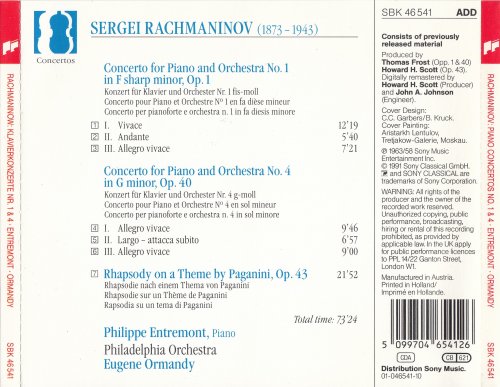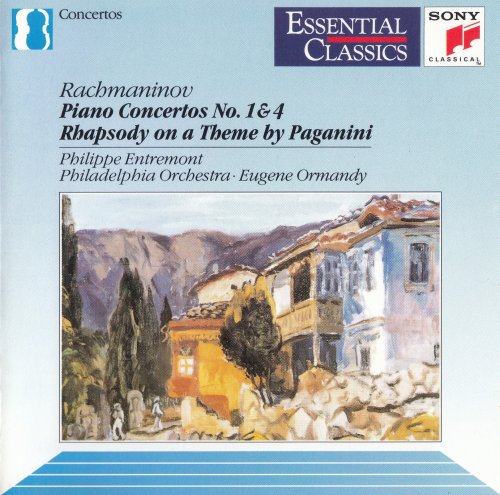
Philippe Entremont, Philadelphia Orchestra, Eugene Ormandy - Rachmaninov: Piano Concertos 1, 4, Rhapsody on a Theme (1991)
BAND/ARTIST: Philippe Entremont, Philadelphia Orchestra, Eugene Ormandy
- Title: Rachmaninov: Piano Concertos 1, 4, Rhapsody on a Theme
- Year Of Release: 1991
- Label: Sony Classical
- Genre: Classical, Piano Concerto
- Quality: FLAC (tracks+.cue,log,scans)
- Total Time: 01:13:24
- Total Size: 344 MB
- WebSite: Album Preview
Tracklist:
01–03. Concerto for Piano and Orchestra no. 1 in F sharp minor, op. 1
I. Vivace [12:24]
II. Andante [05:44]
III. Allegro vivace [07:27]
04–06. Concerto for Piano and Orchestra no. 4 in G minor, op. 40
I. Allegro vivace [09:51]
II. Largo - attacca subito [06:57]
III. Allegro vivace [09:06]
07. Rhapsody on a Theme by Paganini [21:51]

01–03. Concerto for Piano and Orchestra no. 1 in F sharp minor, op. 1
I. Vivace [12:24]
II. Andante [05:44]
III. Allegro vivace [07:27]
04–06. Concerto for Piano and Orchestra no. 4 in G minor, op. 40
I. Allegro vivace [09:51]
II. Largo - attacca subito [06:57]
III. Allegro vivace [09:06]
07. Rhapsody on a Theme by Paganini [21:51]
Rachmaninov completed the First Piano Concerto – published as op. 1 – in 1891, when he was 18. The first movement was first performed in 1892 at a Conservatoire Concert while Rachmaninov was still a student. A critique stated that there was "already much promise" in it while "there was not yet of course any individuality". Rachmaninov soon distanced himself from the work, regretting its premature publication and eventually in 1917 undertook a radical revision, involving in particular an extensive restructuring of the Finale. What we now know as Rachmaninov's First Piano Concerto comes mainly from this later period, namely from the years between the Third and Fourth Concertos. Nevertheless, both the form and the orchestration are noticeably less complex than those of the Second or the Third.
The beginning of the first movement is all too clearly reminiscent of the Piano Concertos of Schumann and Grieg, as are other parts of Tchaikovsky's symphonie writing, for instance in the opening fanfare, which recurs twice with some variation in this movement and at the beginning of the Finale, without its formal role being at all clear.
After the October Revolution, Rachmaninov left his native country and began, particularly in the United States, his great career as a concert pianist with which to maintain his standard of living abroad. The other side of the coin was that this career prevented him composing; for seven years Rachmaninov wrote virtually nothing. At the beginning of 1926, however, he freed himself for a time from his commitments and in a few months produced the Fourth Piano Concerto, which was still based on material from the end of his time in Russia. Nevertheless, the break with the past is unmistakeable: tricky figuration, a harder sound, a more aggressive character and a great deal less ingratiating than one had been accustomed to with Rachmaninov. These very characteristics, which strike present-day audiences in a positive way as signs of a more modem musical idiom, disappointed his contemporaries; the reception of the work both in America and in Europe was luke-warm, although some distinguished conductors – Leopold Stokowski at the premiere in Philadelphia in 1927 and Bruno Walter in Berlin in 1931 – took it up, Rachmaninov himself as usual playing the solo part.
It was not until the Rhapsody on a Theme by Paganini for piano and orchestra that Rachmaninov once again enjoyed an outstanding success with this brilliant display of fireworks, not only in terms of extreme virtuosity but also of compositional imagination. The Rhapsody is a series of 24 variations on a theme by Paganini, which Rachmaninov, with great originality, quotes after, rather than before the first variation. The theme is that of the Caprice in A minor (from the 24 Caprices for solo violin op. 1, written in about 1805), which, at the latest, became famous when Franz Liszt adapted it in his Paganini Studies; Brahms based two breath-taking sets, each containing 14 variations, on it and a few years after Rachmaninov, Lutoslawski tackled it again in 1941 in his Paganini Variations for two pianos.
The beginning of the first movement is all too clearly reminiscent of the Piano Concertos of Schumann and Grieg, as are other parts of Tchaikovsky's symphonie writing, for instance in the opening fanfare, which recurs twice with some variation in this movement and at the beginning of the Finale, without its formal role being at all clear.
After the October Revolution, Rachmaninov left his native country and began, particularly in the United States, his great career as a concert pianist with which to maintain his standard of living abroad. The other side of the coin was that this career prevented him composing; for seven years Rachmaninov wrote virtually nothing. At the beginning of 1926, however, he freed himself for a time from his commitments and in a few months produced the Fourth Piano Concerto, which was still based on material from the end of his time in Russia. Nevertheless, the break with the past is unmistakeable: tricky figuration, a harder sound, a more aggressive character and a great deal less ingratiating than one had been accustomed to with Rachmaninov. These very characteristics, which strike present-day audiences in a positive way as signs of a more modem musical idiom, disappointed his contemporaries; the reception of the work both in America and in Europe was luke-warm, although some distinguished conductors – Leopold Stokowski at the premiere in Philadelphia in 1927 and Bruno Walter in Berlin in 1931 – took it up, Rachmaninov himself as usual playing the solo part.
It was not until the Rhapsody on a Theme by Paganini for piano and orchestra that Rachmaninov once again enjoyed an outstanding success with this brilliant display of fireworks, not only in terms of extreme virtuosity but also of compositional imagination. The Rhapsody is a series of 24 variations on a theme by Paganini, which Rachmaninov, with great originality, quotes after, rather than before the first variation. The theme is that of the Caprice in A minor (from the 24 Caprices for solo violin op. 1, written in about 1805), which, at the latest, became famous when Franz Liszt adapted it in his Paganini Studies; Brahms based two breath-taking sets, each containing 14 variations, on it and a few years after Rachmaninov, Lutoslawski tackled it again in 1941 in his Paganini Variations for two pianos.

Classical | FLAC / APE | CD-Rip
As a ISRA.CLOUD's PREMIUM member you will have the following benefits:
- Unlimited high speed downloads
- Download directly without waiting time
- Unlimited parallel downloads
- Support for download accelerators
- No advertising
- Resume broken downloads


